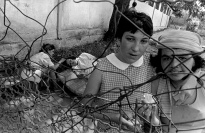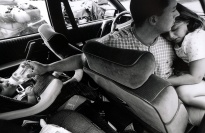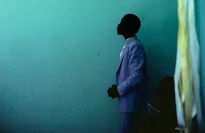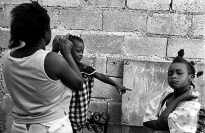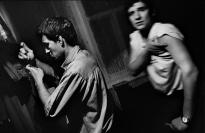About Moving Walls 10
The tenth exhibition of Moving Walls opens as the war in Iraq continues to capture headlines and roil a divided public. Lost in the clamor, however, are stories that may fail to command immediate attention. Moving Walls seeks to compensate for this imbalance. Covering subjects ranging from wounded veterans to the HIV epidemic in Russia and Ukraine, the six photographers in our tenth show provide insight into issues that are all too often overlooked.
The names of the American soldiers who have been killed in Iraq are printed in the newspaper almost every day, but the wounded are often sent home without notice, left to struggle quietly with a loss of limb or painful disfigurement. By showing us the human cost of war on an intimate scale, Nina Berman’s portraits of injured American soldiers undermine any illusion that war is quick and bloodless. Gigi Cohen’s images of a young Haitian girl living in forced servitude also personalize an issue of much larger scope. In telling the story of Josiméne, Cohen’s photographs bring into focus the problem of illegal child labor practices around the world.
As always, Moving Walls challenges us to confront issues we may purposely ignore. But, as the photographs make clear, such indifference can often have devastating consequences. John Ranard’s images of injection drug users in Russia and Ukraine, many of whom are teenagers, give attention to the burgeoning HIV epidemic in a region that has so far done little to stop it. Likewise, Eugene Richards shows us the cruelty and mistreatment that the mentally ill and the developmentally disabled suffer with his photographs of public psychiatric institutions. Deprived of proper medical care, counseling, and education, residents stand little chance of living productively within these facilities.
Other photographers challenge our preconceptions. Cuba may lie only a hundred miles away from U.S. shores, but for many Americans it remains a place of myth. Alex Webb captures the paradox of daily life in this island nation, where the past continues to shape an uncertain future. Stephen Shames counters the stereotype of low-income fathers as dead-beat dads. Enrolled in parenting programs that provide them with job skills and self-esteem, the men in his photographs play an active role in their children’s lives.
